- Home
- Gore Vidal
Lincoln Page 2
Lincoln Read online
Page 2
“And you’re as handsome, Governor, as your portraits.” Lincoln bowed like a jacknife—a droll, swift effect, thought Washburne, delighted to be present at the first real meeting of the great rivals who had threatened to divide the six-year-old Republican Party between the free-the-slaves-at-any-cost abolitionists occasionally represented, if not exactly led, by Seward, and the more moderate no-extension-of-slavery Westerners represented by Lincoln, a successful railroad lawyer and political failure: one term in the House of Representatives twelve years ago; one lost race for the Senate two years ago; and now the Presidency. Even Lincoln’s old friend Washburne still found it hard to believe that such an incredible political miracle had indeed taken place. But then Washburne was not alone in being unable to figure out just how it was that Lincoln had managed to seize the nomination from Governor Seward; and then go on to defeat the Northern Democratic candidate, the famous Stephen A. Douglas—who had so decisively defeated him for the Senate—as well as two other candidates, the Southern Democratic candidate, John C. Breckinridge, and the Whig John Bell. With not quite forty percent of the total vote, Lincoln was very much a minority president; but he was president.
Seward motioned for Lincoln to sit at the head of the table with himself to the right and Washburne to the left. When Seward called for a waiter, he was greeted with a hoot of laughter. “We don’t serve nothin’ till eight.”
“Mike!” shouted Washburne. The old porter moved amongst the waiters; in a matter of minutes, they were breakfasting on the first Potomac shad of the year.
“I guess this will be about the last time you’ll ever be able to eat in here.” Seward helped himself liberally to the shad’s roe.
“I’m sure that there will be worse privations in store for me.” Lincoln munched an apple. A teetotaller like Washburne, Lincoln was also, unlike his friend, averse to food in general. For several years Washburne, stout and rosy, had been urging Lincoln to eat more, if only to cure himself of a constipation so severe that he seldom moved his bowels more than once a week; and was obliged to drink by the gallon a terrifying laxative called blue mass. But Lincoln looked healthy enough, thought Washburne, if too lean; and he was strong as the proverbial ox; could lift from the floor, with arm outstretched, a heavy ax at the shaft’s end.
When the fascinated waiters had moved out of earshot—and Mike had moved to stand guard at the door—Lincoln said to Seward, in a low voice, “I will never live this down, sneaking like a thief into the capital.”
“Sir, the plot was real.” Seward sneezed; then blew his nose loudly in a yellow silk handkerchief.
Washburne substituted for the momentarily incapacitated leader. He turned to Lincoln: “As your car was passing through Baltimore—they pull it by horses, you know, between the two depots—a gang of plug-uglies were planning to waylay you then and there.”
“But with sufficient guards—”
Seward interrupted Lincoln with a wave of an unlit cigar. “There wasn’t time between when we got news of the plot and your arrival in Baltimore. So General Scott insisted you come, as you did, with both houses of Congress informally concurring.” Seward looked at Washburne, who nodded gravely, as sole representative of the lower house.
Lincoln stretched his arms until his back made a creaking sound. “I can’t say I’d have objected too much to getting shot. I tell you I thought that trip would never end. There is nothing more like eternity than a train ride of twelve days, unless,” he added, “it’s two people and a ham, as my father-in-law used to say.” Seward chuckled and lit his cigar.
“The trip sounded like a triumph, from what we read in the press,” said Washburne.
“Well, I’ve never given so many speeches and said so little. So I suppose it was remarkable in that.”
Seward blew cigar smoke at the ceiling. “I was troubled to read, sir, that you had said somewhere along the line that no great harm had been done, even though six states have already left the Union and even more are threatening to go, while rebels are busy seizing Federal property all the way from Florida to North Carolina.”
“I said no harm to anyone has been done.” Lincoln’s voice was even. “As yet.”
The last monosyllable had its effect on both Seward and Washburne.
“You know,” said Seward, trying a different tack, “that I am supposed to be the war-to-the-knife fellow—”
“The conflict is ‘irrepressible’ is what you said.” Lincoln smiled. “That’s how you got me the nomination.”
“Damnedest stupidest speech I ever gave!” Seward paused. “I know you don’t drink or smoke. Do you draw the line at profanity, too?”
“Why, no! Fact, once when I was out on the circuit in Illinois, a stranger offered me whiskey and I said, no, I don’t drink and then he gave me a chew of tobacco and I said, no, I don’t chew and then he said, ‘Well, I’ve found that those with damned few vices have damned few virtues.’ ”
Over the years, Washburne had heard Lincoln tell this particular story a dozen times; and the wording never varied. Lincoln’s little stories tended to come at regular intervals, as a form of punctuation—or evasion. But Lincoln was also a master of the long, cumulative, funny story; and many times Washburne had sat at the stove of some backwoods Illinois tavern when the lawyers on circuit would compete in story-telling and it was always Lincoln who won. Once he had got a group to laugh at the first detail, he would then add, relentlessly, more and more wilder and wilder details until men choked with laughter as the easy tenor voice continued, with all due gravity, to make them positively drunk with laughter. He was equally impressive as a speaker on those occasions when he was carefully prepared. But then, except as a humorist, he had no naturally easy way with an audience. He needed a well-prepared brief. Washburne hoped that the grip-sack on the chair next to Lincoln contained such a brief.
Seward suggested that Lincoln visit his new home later in the day and meet the outgoing president, Mr. James Buchanan. “A harmless old thing,” said Seward.
Washburne could not let that go so easily. “Harmless? He let the rebels in Florida seize Federal property at Pensacola and Key West. He let the rebels in South Carolina occupy Fort Moultrie, a Federal fort …”
“I don’t think Mr. Buchanan can be held entirely responsible.” Seward was mild. “After all, they gave us plenty of warning. They said that if our friend here was elected president, they’d leave the Union. And he was. And they did.”
“Along with Mississippi, Alabama, Georgia, Louisiana and … and Virginia, too, I’ll bet!”
“What about Virginia?” Lincoln was suddenly alert. “Virginia is the key to this particular tough lock.”
Seward shrugged. “The so-called Peace Conference has been in session for two weeks now with old President Tyler—the last of the Virginians—presiding.”
“What is the mood?”
“Like that of most peace congresses—very warlike.”
“If Virginia goes …” Lincoln stopped.
“There will be war,” said Washburne.
Seward said nothing; but he studied Lincoln closely for some sign of intent. The face gave nothing away. Then, almost casually, Seward said, “You know, in a way, we are well rid of those cotton republics—and their problem of slavery.”
“Where is your ‘irrepressible conflict’?” Lincoln smiled, somewhat weakly, thought Washburne; then Washburne attacked a plate of fried oysters, a delicacy unknown in his early days, and all the more to be savored at Washington City.
“Highly repressible if we let our erring sisters—poor foolish ladies—go in peace. Then we can turn our attention to Canada, to Mexico, to the Indies—”
“Mr. Seward, you dream of empire for a government which has just lost half its military stations to home-grown rebels.”
Seward made a gracious arabesque with his cigar. “Let the mosquitoes occupy those infernal forts. Have you ever seen the South?”
“I was in New Orleans once,” said Lincoln, “and,” he added
with a certain grimness, “I am Kentucky-born, as the world knows.”
“A border-state,” said Washburne.
“A slave border-state,” said Lincoln.
“When I was governor of New York”—Seward was dreamy—“I used to go over to Canada every chance I could get. And you know those Canadians, the ones who speak English—the best of the lot—are eager to join our Union.”
“I seem to recall,” said Lincoln, putting down his second apple core and pushing his chair away from the table, “that on the two occasions that we invaded Canada—in the Revolution and then again in 1812—they put up quite a fight to stay out of our Union.”
“Misunderstandings of the day.” Seward was airy. “That’s all. They’re different now.”
Lincoln got to his feet. “We’ve got a few misunderstandings of our own now to deal with before we go traipsing off into Canada. We’ve also got—you and I—some Cabinet-making to do.”
“Will you take dinner with me tonight?” asked Seward.
“With pleasure. Now I’m going to get some sleep. There was a drunk in my car last night who kept on singing ‘Dixie’ over and over again.”
“Not our favorite song,” said Washburne.
“No, sir, it is not.” Lincoln started toward the door where the aged Mike stood guard; then he paused. “ ‘Look away, look away, Dixie Land!’ ” Lincoln quoted the song’s chorus; he frowned. “Look away to what?”
“Or from what?” said Seward.
“Plainly, from me. But we shall change that.” He turned to Seward, “You don’t remember, Mr. Seward, but years ago, you and I once spoke together at Tremont Temple in Boston …”
“In September of 1848. You were canvassing New England for Zachary Taylor, and you wore a long linen duster in the street. I thought you’d forgotten.”
“And you were wearing yellow pantaloons like the ones you’re wearing now. I guess politicians like us never forget anything. Good morning, gentlemen.” With that, Lincoln was gone.
Washburne turned to Seward. “What do you think, Mr. Seward?”
Seward frowned. “I don’t know. I’m not used to prairie statesmen, if you’ll forgive me, Mr. Washburne.”
“Forgiven. After all, you and I are used to each other. But Abe isn’t really Western, you know. In fact, he isn’t really like other people.”
“In what way? I thought he was very much your typical Western politician, man of the people, a splitter of rails, that kind of thing.”
Washburne laughed. “That was all made up for the campaign.”
“You mean Honest Abe the Rail-Splitter is a fraud?”
“Yes and no. I’m sure he split a rail or two in his youth, but he’s always been a politician and a lawyer. The honest part is true, of course. But all the rest was just to get out the vote at home.”
“And here I thought we had another ‘Tippecanoe’ Harrison on our hands.”
“No, Mr. Seward, what we’ve got on our hands is a very complicated secretive sort of man. Don’t underestimate him.”
Seward stared at Washburne to see if this might be some kind of obscure Western joke. When he saw that Washburne was serious, he smiled what journalists referred to as “Seward’s sly, Jesuit smile.” “Well, I don’t think I’m ever apt to do that, considering this peculiar line of work we’re in.”
“You’ll be his secretary of state, won’t you?”
Seward nodded. “That’s the plan. If we see eye to eye.”
“What’s your condition?”
“That we agree on the rest of the Cabinet. I would like to see a Cabinet of like-minded men. I’m a Whig. I’m a moderate. So’s Mr. Lincoln. So are most of our party’s leaders. But I’m afraid he’ll insist on including out-and-out abolitionists like Chase, and Whigs like Bates, and Democrats like Welles.”
“What’s wrong with that?” Washburne played the innocent. Actually, he knew Seward’s game—the so-called Albany Plan had been secretly formulated during the fall by Seward and his chief henchman, Thurlow Weed, the proprietor of The Albany Evening Journal. They wanted to exclude from the Cabinet such presidential contenders as Chase. They wanted, most ambitiously—not to mention unConstitutionally—to turn Lincoln into a figurehead; the actual administration of the country would be taken over by Seward, the party’s national leader and most famous man. Seward would be premier to Lincoln’s powerless monarch.
“I think it most statesmanlike,” said Washburne cautiously, “to bring together all the pro-Union elements—Democrats and abolitionists as well as Whigs and moderates. Even”—he smiled at Seward—“if some of them are rivals like Chase. After all, he’s picked you, his principal rival.”
“I was.” Seward struck the elegiac note. “But no longer. I’m now too old ever to be the President.” Seward smiled to show that he was serious; thereby convincing Washburne that he was not. “But to have Chase and the others on the premises may be too much for him to handle. Well, we’ll see, won’t we?”
Seward slid his arm companionably through Washburne’s. As the two men left the dining room, the doors were thrown open for the first breakfasters of the day—a horde of pale children, who shouted and wept as their grim-faced mothers herded them with pleas and cuffs to the buffet table.
TWO
DAVID HEROLD stared at the front page of the Evening Star; then he did something that he had never done before: he actually bought a copy of the paper from the ancient Negro who had been selling newspapers at the corner of H and Sixth streets for all of David’s nineteen years.
“He here!” said the old man, giggling. “He snuck in like a chicken thief.”
As David walked down H Street, he read the Star’s special story of the President-elect’s secret arrival in the city. There were not many facts. Apparently, Mrs. Lincoln and their three sons and the rest of the President-elect’s party would arrive in the afternoon, as originally planned. But for reasons not yet known, Mr. Lincoln and two detectives had arrived on the overnight cars; and they had been observed in the lobby of Willard’s Hotel at about seven in the morning.
David stopped in front of Number 541, H Street, a narrow, lead-colored, four-story brick house with a yard to one side, containing a wooden shack and a number of dispirited chickens. An outside staircase connected the second floor with the street, permanently shadowing the ground floor. From the second floor a pair of firm hands were pounding music out of a piano not entirely in tune.
“Hey, Annie!” David shouted; then shouted again. The head of an eighteen-year-old girl appeared at the upstairs window.
“I’m practising.”
“Lincoln’s here! He snuck in this morning. Just like a”—David sought for novelty but not hard enough—“some old chicken thief! It’s in the Star.”
“Come on up.”
David hurried up the brick steps, opened the door, found himself face to face with Annie’s mother, who was carrying a tray of food. “Oh, Mrs. Surratt, it’s me …”
“I heard you, David. And I’ve already heard that Mr. Lincoln’s here.” Mrs. Surratt was a handsome auburn-haired woman with a body that David, who read romantic stories in yellow covers, knew was Junoesque. In some ways, he found Mrs. Surratt more to his taste than her daughter; and this curious preference convinced him that he was probably the monster of depravity that his seven sisters liked to claim he was.
“How’s Mr. Surratt?” Thought of the seven sisters reminded him of his manners.
“We hope for the best. I try to get him to eat. But he just—fades away.” Mrs. Surratt motioned for David to precede her into the front parlor.
David crossed the flowered Brussels carpet, uncomfortably aware of the terminal state of his huge cracked leather shoes.
In the parlor Annie sat at the piano, with one hand raised over the keyboard; pretty as a picture, thought David, who had seen the actual picture that she was imitating in the window of Jarman’s music store on O Street, from an advertisement for Chickering’s pianoforte.
�
��Here’s the paper,” he said, putting it in her poised and posed hand. “I bought it,” he added. Usually David borrowed newspapers; or stole them. Despite the gentility of David’s mother—widow of a government employee who had left her with eight children and a house near the Navy Yard—David had grown up with a pack of wild Washington boys, all of them Southern—or Southron, as they called themselves, and devoted to mischief of every sort. They were only a cut above the Baltimore plug-uglies, those real street toughs who were now threatening to invade the city and disrupt the President’s inaugural.
“It was the plug-uglies, I guess, that made him sneak through Baltimore.”
Annie read the paper as if it were a sheet of difficult music. In the back parlor, Mrs. Surratt’s low voice could be heard, pleading with her husband to eat. He merely coughed. He coughed so much that hardly anyone noticed the cough anymore; or Mr. Surratt for that matter. No longer visible to the world, he was no longer part of it.
The Surratt family owned a prosperous truck farm in Maryland, close by Surrattsville, a village named after them. Now that Mr. Surratt was ill—dying, to give it the right word—Mrs. Surratt herself presided over the great wagon that brought the farm’s produce to the Center Market, while Annie attended a Catholic seminary. The Protestant David never knew why Mr. and Mrs. Surratt were converts; but both had converted years ago, and now their youngest son, John, aged sixteen, was at St. Charles, over in Maryland, studying to be a priest. The oldest son, Isaac, was an engineer.
The Surratts and the Herolds had been acquaintances for close to a generation; they thought of Washington as a Southern city, which it was—and a Maryland city at that, which meant a population somewhat more volatile than that of staid neighboring Virginia, whose claim to the city was nearly as substantial as Maryland’s. The District of Columbia was an anomalous ten-mile-square parallelogram carved out of Maryland and bounded by the Potomac River and Virginia.

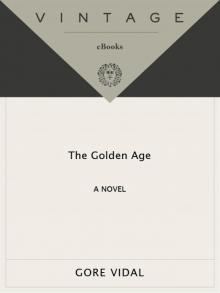 The Golden Age: A Novel
The Golden Age: A Novel Death Before Bedtime
Death Before Bedtime Burr
Burr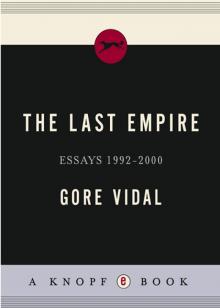 The Last Empire
The Last Empire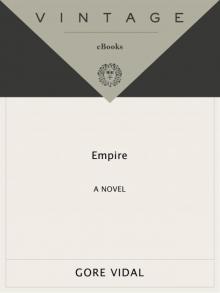 Empire: A Novel
Empire: A Novel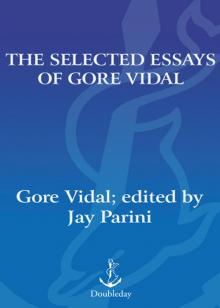 The Selected Essays of Gore Vidal
The Selected Essays of Gore Vidal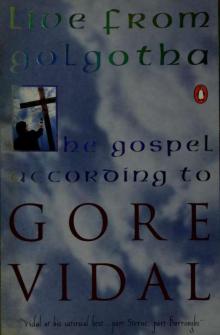 Live From Golgotha
Live From Golgotha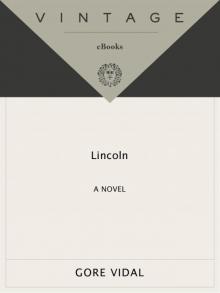 Lincoln
Lincoln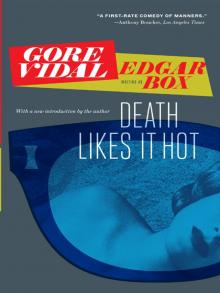 Death Likes It Hot
Death Likes It Hot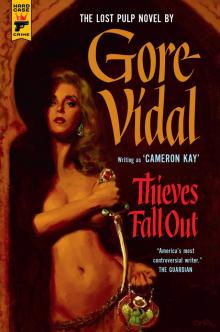 Thieves Fall Out (Hard Case Crime)
Thieves Fall Out (Hard Case Crime)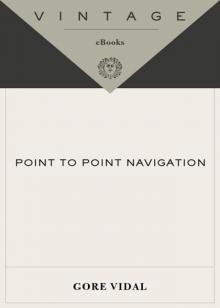 Point to Point Navigation
Point to Point Navigation Williwaw
Williwaw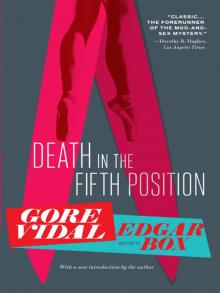 Death in the Fifth Position
Death in the Fifth Position In a Yellow Wood
In a Yellow Wood Julian
Julian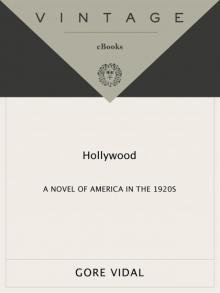 Hollywood
Hollywood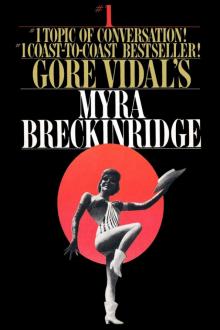 Myra Breckinridge
Myra Breckinridge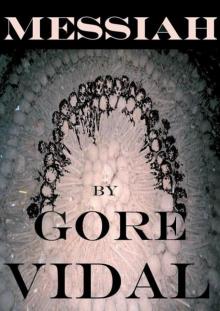 Messiah
Messiah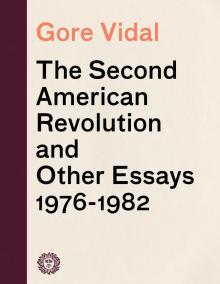 The Second American Revolution and Other Essays 1976--1982
The Second American Revolution and Other Essays 1976--1982 Homage to Daniel Shays
Homage to Daniel Shays Empire
Empire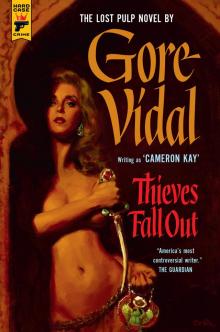 Thieves Fall Out
Thieves Fall Out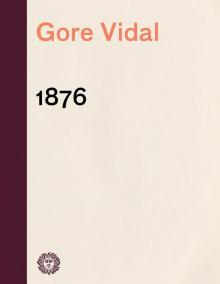 1876
1876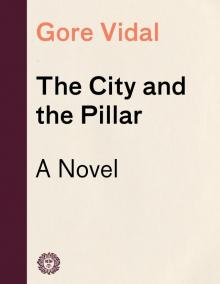 The City and the Pillar
The City and the Pillar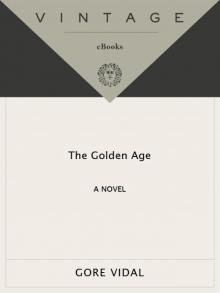 The Golden Age
The Golden Age At Home
At Home